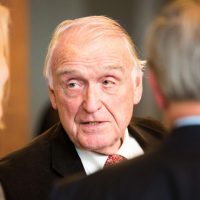To Err on German Unity…

Karl Kaiser
Harvard University
Karl Kaiser is Adjunct Professor of Public Policy at the Kennedy School and Senior Associate of the Program on Transatlantic Relations of the Weatherhead Center for International Affairs at Harvard.
Looking back after twenty-five years to those extraordinary events leading to German unification and the establishment of democratic regimes in Eastern Europe, I am often reminded of the American icon Yogi Berra’s remark that predictions are difficult, particularly about the future. So many were wrong on German unity including the mighty and influential (and also myself).
On November 9, 1989, I was in Warsaw accompanying Chancellor Helmut Kohl, who had invited me to come along on his state visit as his guest, since I had been the German Co-chair of the German-Polish Forum for a number of years. As is well known, he interrupted his visit when the news of the fall of the Berlin Wall arrived, while the delegation waited for his return from Berlin where he was badly treated at a rally commemorating the event. What is less known is his response to Lech Walesa. When the news of the Wall’s apparent opening interrupted their meeting, Walesa congratulated the Chancellor “Now Germany gets unified!” and Kohl parried immediately telling him that this would surely take years,
As we all know it took less than a year. The dynamic forces unleashed by the populations of Eastern Europe and East Germany overwhelmed the process. But in his estimate Helmut Kohl was in the company of many Germans, including myself, as I was vividly reminded more than a year later. I bumped into an old acquaintance at an airport, a well-known foreign policy expert, who in an almost accusatory manner addressed me “Karl, you and your colleagues explained to us non-Germans at innumerable conferences that foro strategic reasons the Soviet Union would never give up the GDR, the Western outpost of its empire. How could you be so wrong?” We were wrong because we did not expect the unpredictable changes of the Gorbachev era. Did anybody get it right? Some did, among them the American Ambassador to Bonn, Vernon Walters, who in early 1989 publicly stated that Germany would very soon be unified, a pronouncement that got him into some trouble not only in Washington, but also with some Germans who thought that his remarks could “destabilize the situation.”
There was another kind of prediction at that time which went around the planning staffs of foreign ministries and think tanks and occasionally went public, namely that a united Germany would resort to the old ways of heavy handed power politics. West Germany was the most powerful economy of Western Europe, and was East Germany not the only country where socialism was said to have worked? The merger of both naturally caused a lot of concern. Bonn’s unilateral recognition of Croatia was considered by some as evidence of the emergence of traditional German power politics. U.S. Secretary of State Warren Christopher went so far as to make Germany responsible for the wars in former Yugoslavia, and in some of our traditional partner institutes in Western Europe I encountered an atmosphere almost of hostility never experienced before. The worry that a united Germany could become a problem was visible everywhere. One prominent West European foreign policy expert even remarked to me, “Of course, Germany will now acquire nuclear weapons,” not believing my insistence that there was not the slightest desire in Germany for such an option.
In the end these predictions and fears turned out to be wrong or groundless. A few years after unification I took part in a festive dinner event in one of the grand new buildings that had sprung up at Potsdamer Platz. Henry Kissinger gave a very moving speech stating that what made him particularly proud about the country that had once made him a refugee was the fact that the new German democracy, contrary to the fears of some, had not resorted to a neo-Wilhelminian posture but handled its new gained power very sensibly and in full awareness of its responsibility. And only about ten years later it was no longer fear of German power but concern about the absence of German will to use it that became Europe’s problem. And it was—of all people—the Polish foreign minister Radoslaw Sikorski who most prominently formulated this concern in a speech in Berlin itself.
Karl Kaiser was Otto-Wolff Director of the German Council on Foreign Relations in Bonn and Berlin at that time and now works at Harvard University.








